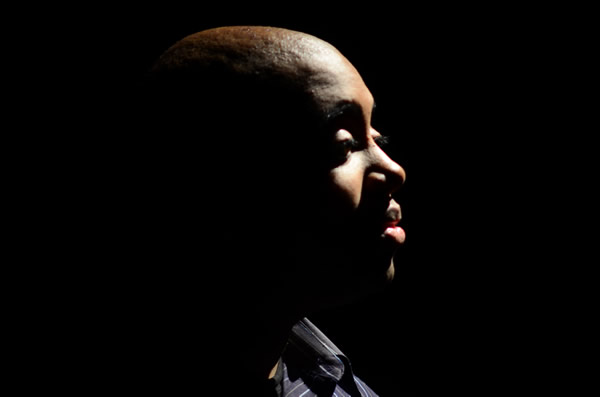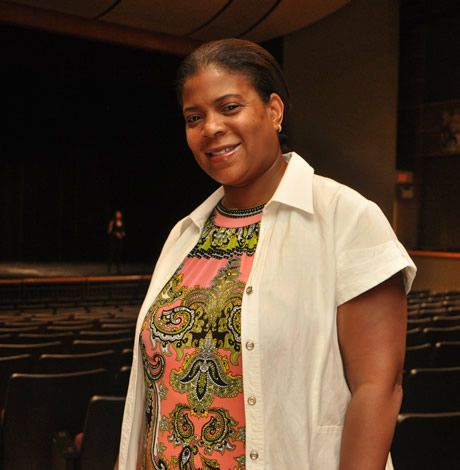Arts & Entertainment
Black and gay in D.C.
Theater festival features two playwrights tackling sexuality, AIDS on stage
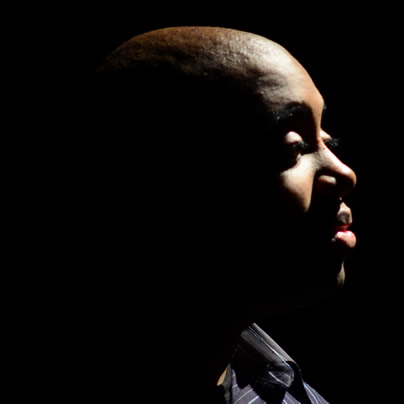
DC Black Theatre Festival
June 23-July 1
‘Moments of Truth,’ June 30
9 p.m., Navy Memorial Theater
701 Pennsylvania Ave., N.W.‘11 x 8 ½ inches,’ June 29
9 p.m., Howard University Blackburn Center
2400 Sixth St., N.W.Ticket prices vary.
dcblacktheatrefestival.com
In the upcoming DC Black Theatre Festival, a commemoration of African-American culture and works, two playwrights seek to shine a spotlight on the black LGBT community.
Monte Wolfe and Alan Sharpe, both black D.C. playwrights, have focused their pieces on sexuality, love and dealing with the complications of HIV/AIDS. Their plays are being featured in the festival, which starts June 23 and runs through July 1 at various locations in the D.C. area.
“A problem is a lack in visibility,” says Sharpe. “Representations of black gays have been very limited, and in the past those characters were used as something to ridicule.”
Sharpe’s piece, “11 x 8 ½ inches,” is a series of short scenes that explores the lives of black gay men living in D.C. Each scene explores ideas of sex and sexuality, sometimes entering into the erotic, raunchy and romantic. The piece is being featured in the New Works Reading Series, a part of the festival that showcases new works by upcoming and established playwrights in the area.
Reginald Richards, a gay actor in Sharpe’s play, says the piece works to break stereotypes of the “typical gay man.”
“People expect us to be very flamboyant and really sexual,” he says. “It is important for people to see we come with all different personalities and different ethnic backgrounds.”
Wolfe’s play, “Moments of Truth,” is also a series of short scenes that show a variety of people dealing with the complications of HIV/AIDS and how it affects love and relationships. With a less than $1,000 budget, the minimalist style keeps the focus on the short but charged interactions between the characters.
“There is something for everybody in the show, whether you are black, white, gay or straight,” he says. “It is about connecting AIDS to sexuality and working through those problems.”
Wolfe was diagnosed with AIDS in late 2004. This helped trigger his interest in HIV/AIDS outreach, in which he created the Brave Soul Collective, a theater company, in 2006. The company focuses on plays with LGBT themes.
Sharpe has been writing plays with LGBT themes since 1992. Coincidentally, he was also diagnosed with AIDS the same year. He and Wolfe have collaborated on several works, and Wolfe is an actor in one of the scenes of Sharpe’s piece.
“Alan has always been a mentor to me,” says Wolfe. “He makes it clear to me the character I want to perform and what I want to write about in my plays.”
Sharpe says that the festival is a good opportunity to shed light on talent that might otherwise be overlooked.
“It is amazing to see artists travel from all over the country to join together for a few days,” he says. “It allows artists to reach a broader range of audience.”
Barbara Asare-Bediako, an actor in Wolfe’s piece, identifies as, “a woman who just loves a woman.”
“My ultimate goal is to make black theater and gay theater a normal thing,” she says. “I want it so we can turn on the TV and it would just be part of society.”
However she says it is still important to focus on talent coming from the African-American community, and doing HIV/AIDS outreach. Asare-Bediako has been involved with several outreach programs, including HIPS, to help prevent the spread of HIV/AIDS.
“I had a cousin who passed,” she says. “I found out months after it happened. My uncle, his father, acts like he never had a son.”
Asare-Bediako also cites the high HIV/AIDS rate in the District as an important factor to consider when selecting themes for the festival. The newly infected HIV/AIDS rate among African-American women has nearly doubled in D.C.’s poorest neighborhoods in the past two years, according to a recent Washington Post report.
Despite their focus on LGBT themes, Sharpe and Wolfe work to keep all kinds of audience members involved.
“We focus on the universal elements and not on division,” says Wolfe. “We cry, we laugh, we dream just like everybody else.”
Jared Shamberger, an actor in Wolfe’s piece who also wrote some of the scenes, says the piece includes a little bit of everything and expresses that everyone experiences powerful moments of truth.
“Even though we do primarily focus on LGBT themes, LGBT people have heterosexual friends and vice versa,” he says. “I don’t think you could present the LGBT story without including the heterosexual experience as well.”
One of his scenes is about a heterosexual couple that just had unprotected sex for the first time before they even went on a first date. They talk about where they are as a couple and about getting tested.
Shamberger agrees that including themes that deal with the HIV/AIDS rate is important.
“The HIV infection is not making headlines anymore,” he says. “People are getting infected everyday still, and I think it is something that people should be made aware of.”
Both pieces develop their themes through short scenes rather than a longer narrative arc. Wolfe says this makes the piece more powerful.
“I think it keeps people on their toes,” he says. “I don’t think I want the audience to get married to one particular character. I want them to see some bits of themselves in all the characters.”
Sharpe and Wolfe say that including LGBT themes in the theater is a great way to make people aware of the LGBT community by drawing them into characters’ lives.
“Gay people go through the same thing, they fall in love and they get heartbroken,” says Bediako. “People need to see these stories, see that gay people live normal lives, whatever normal is.”
Shamberger says it is impossible to write a play about the African-American community without including the LGBT community.
“I think if we are trying to present the landscape of black experience we have to include LGBT people as well,” he says.
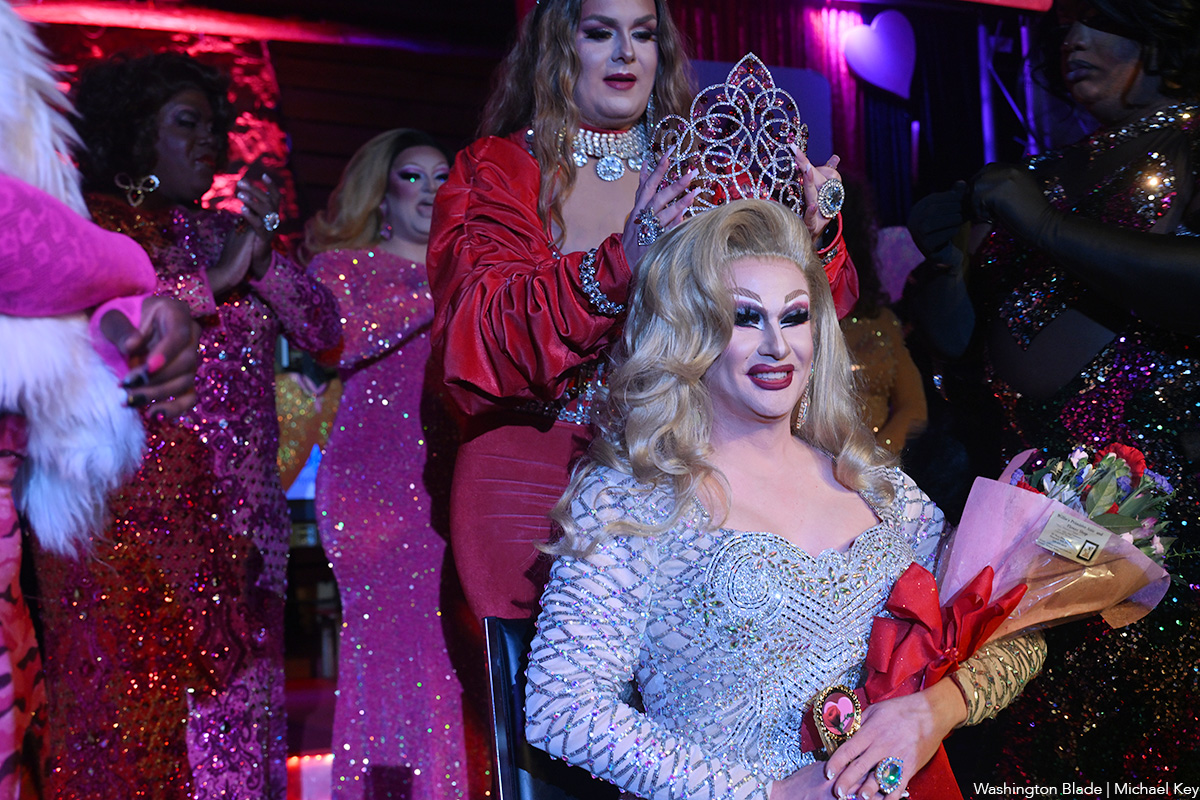
The 44th annual Queen of Hearts pageant was held at The Lodge in Boonsboro, Md. on Friday, Feb. 20. Six contestants vied for the title and Bev was crowned the winner.
(Washington Blade photos by Michael Key)
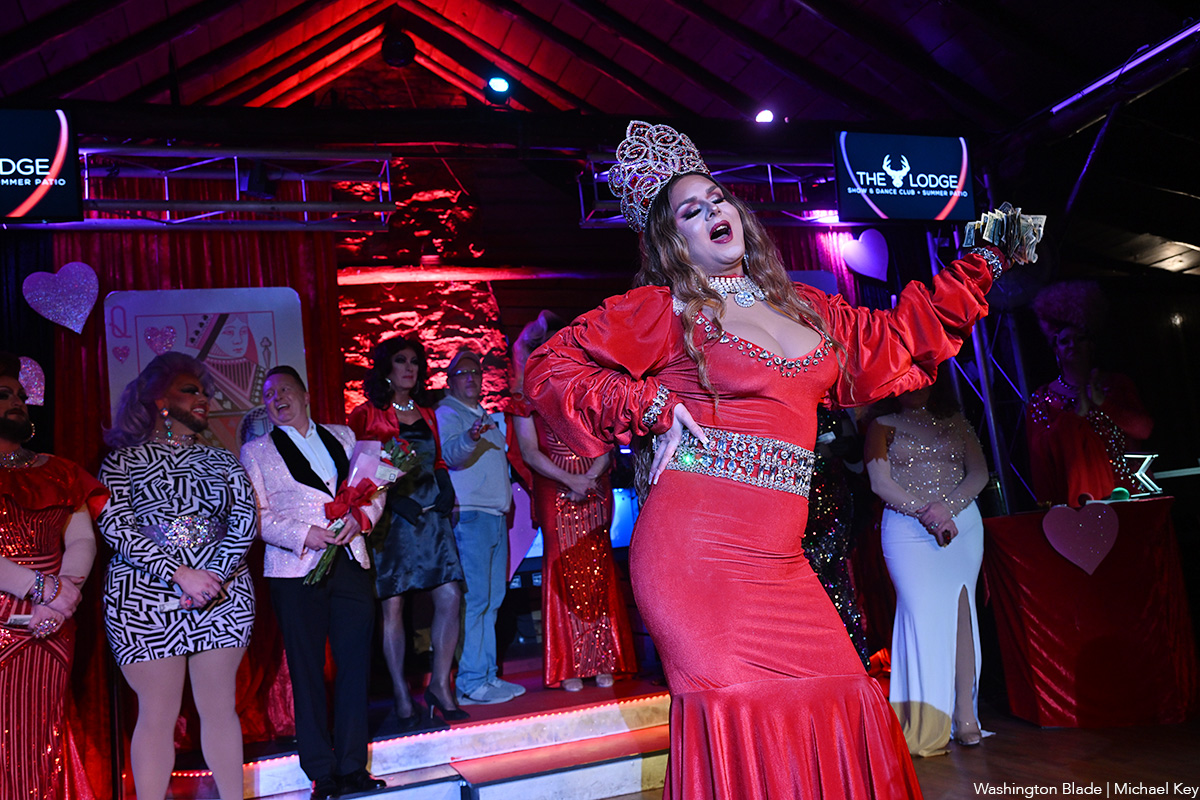
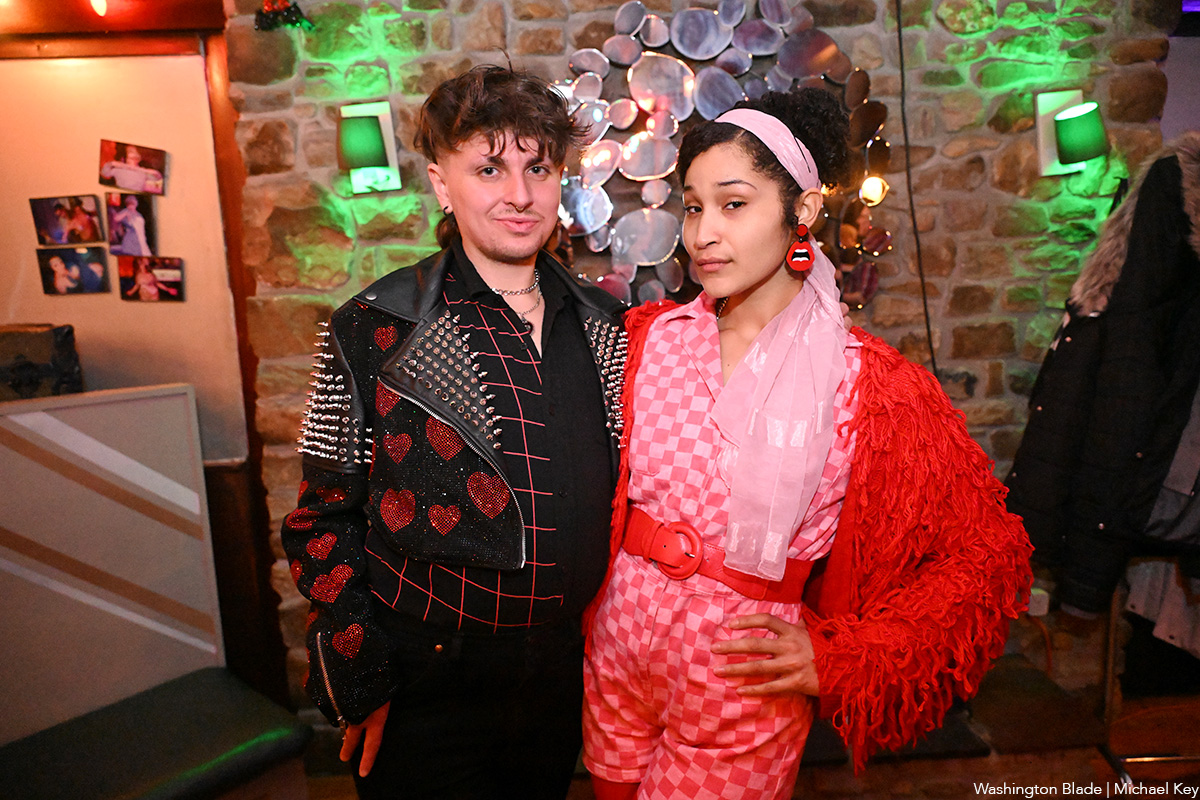
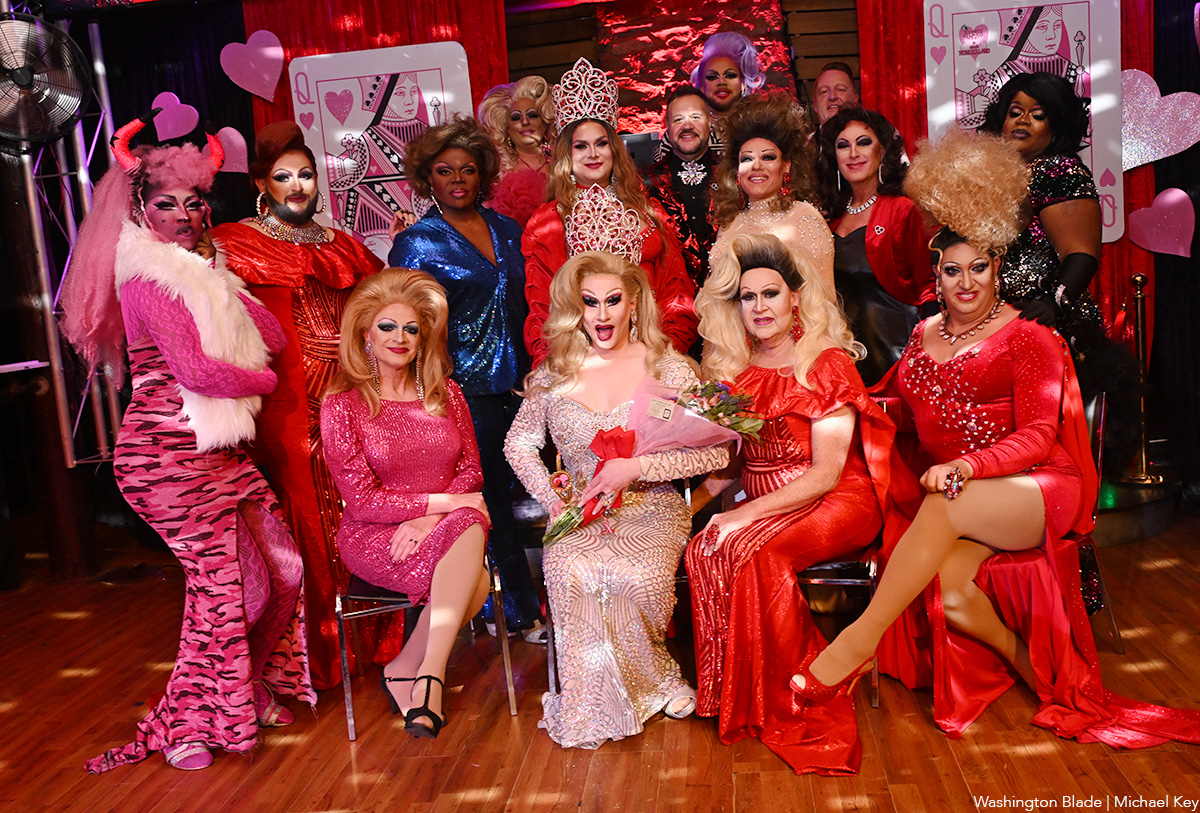
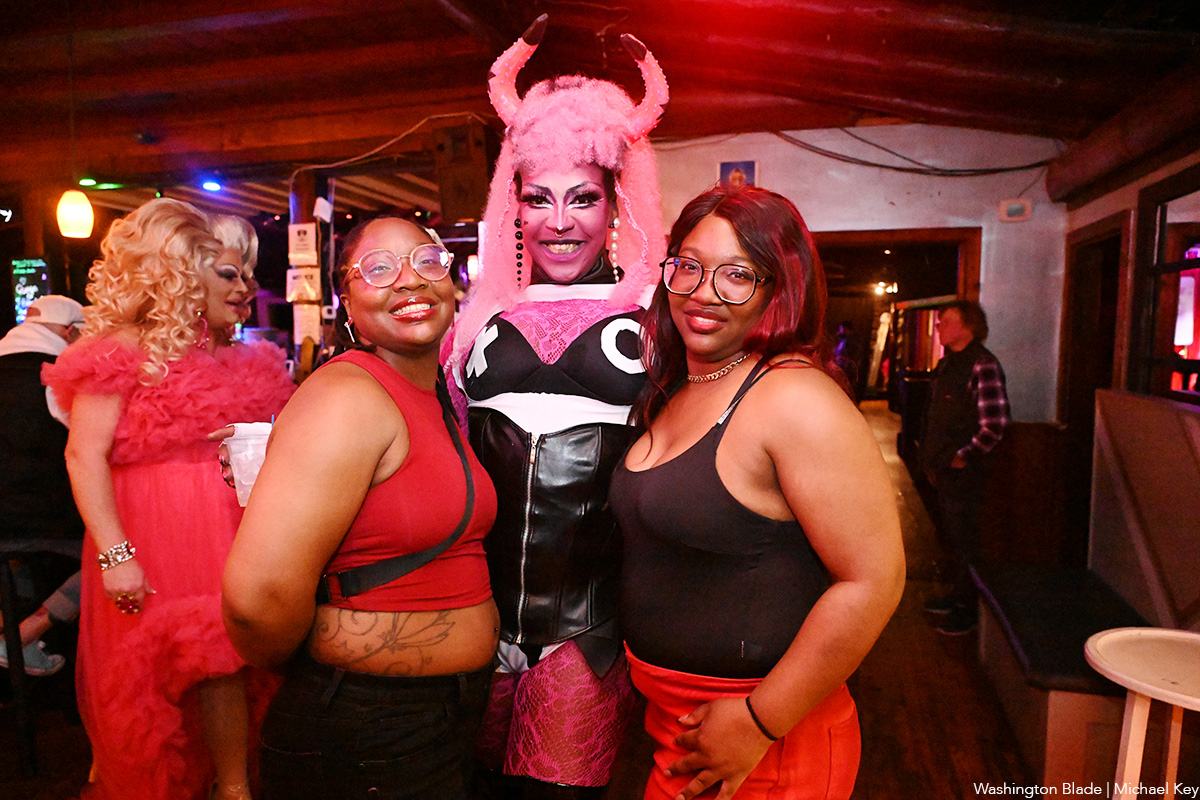
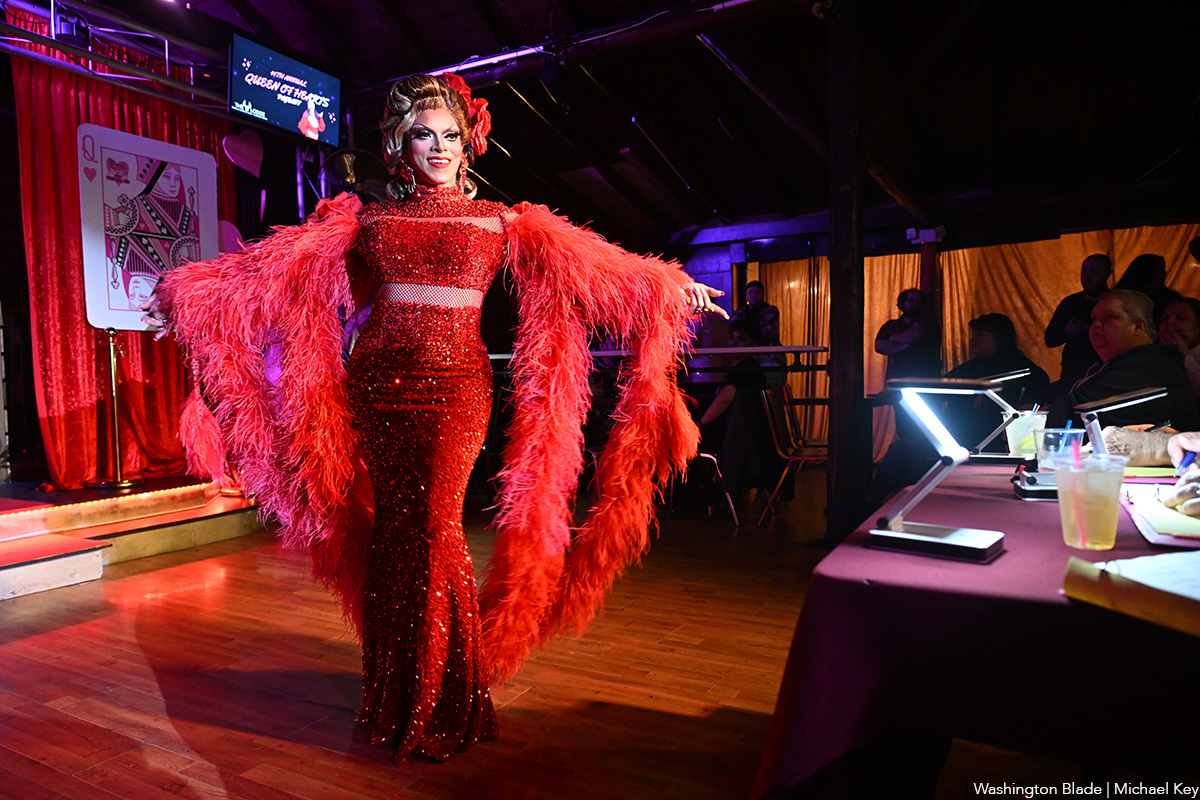
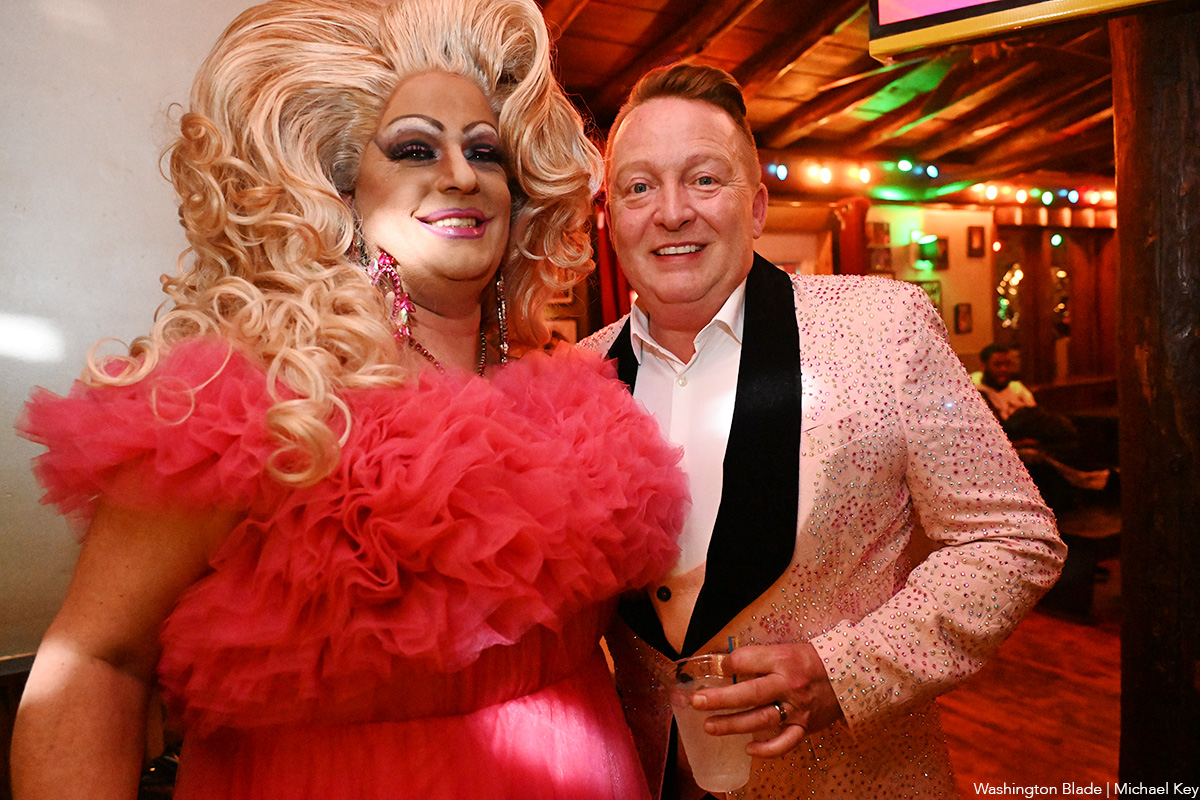
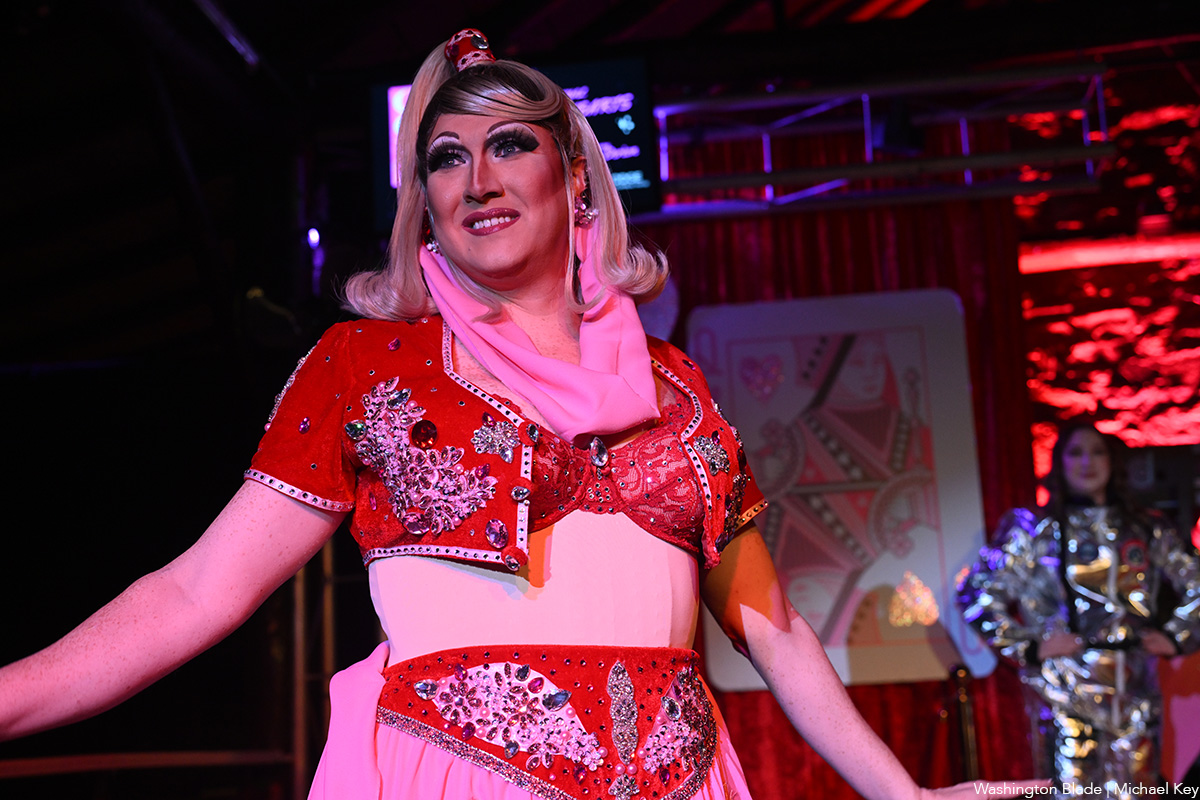
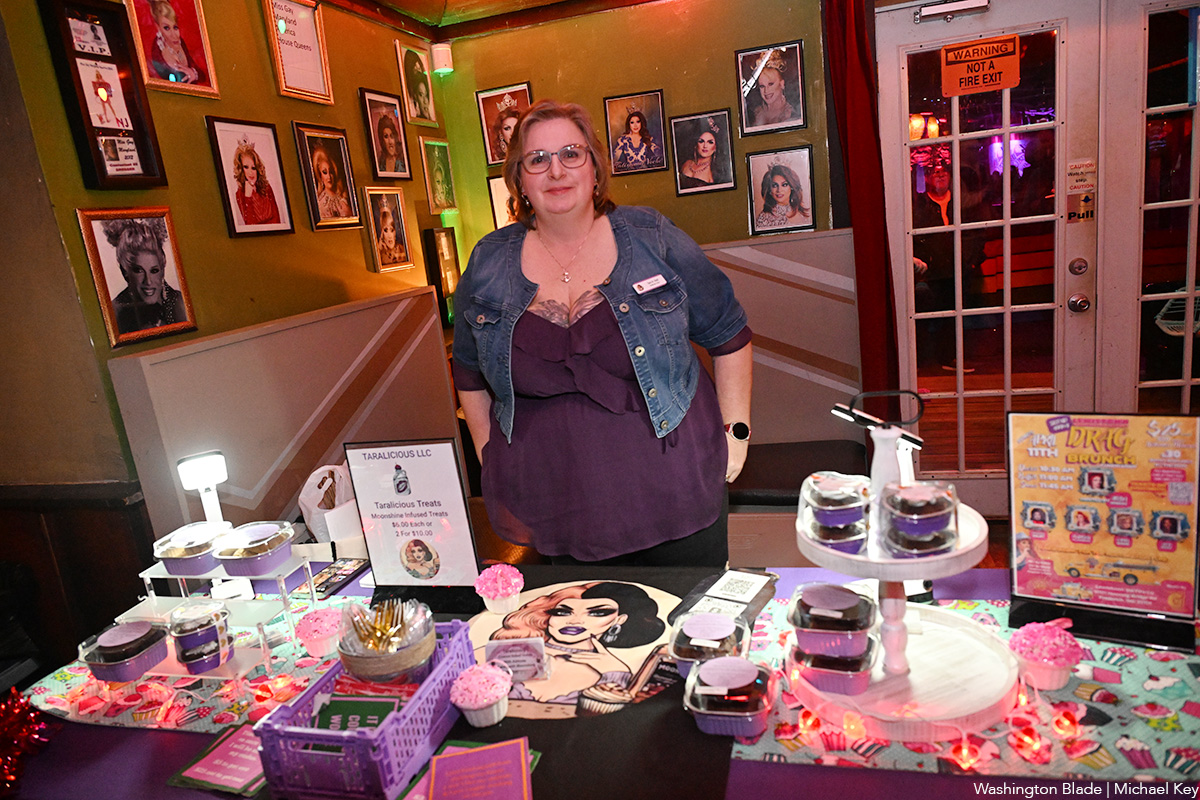
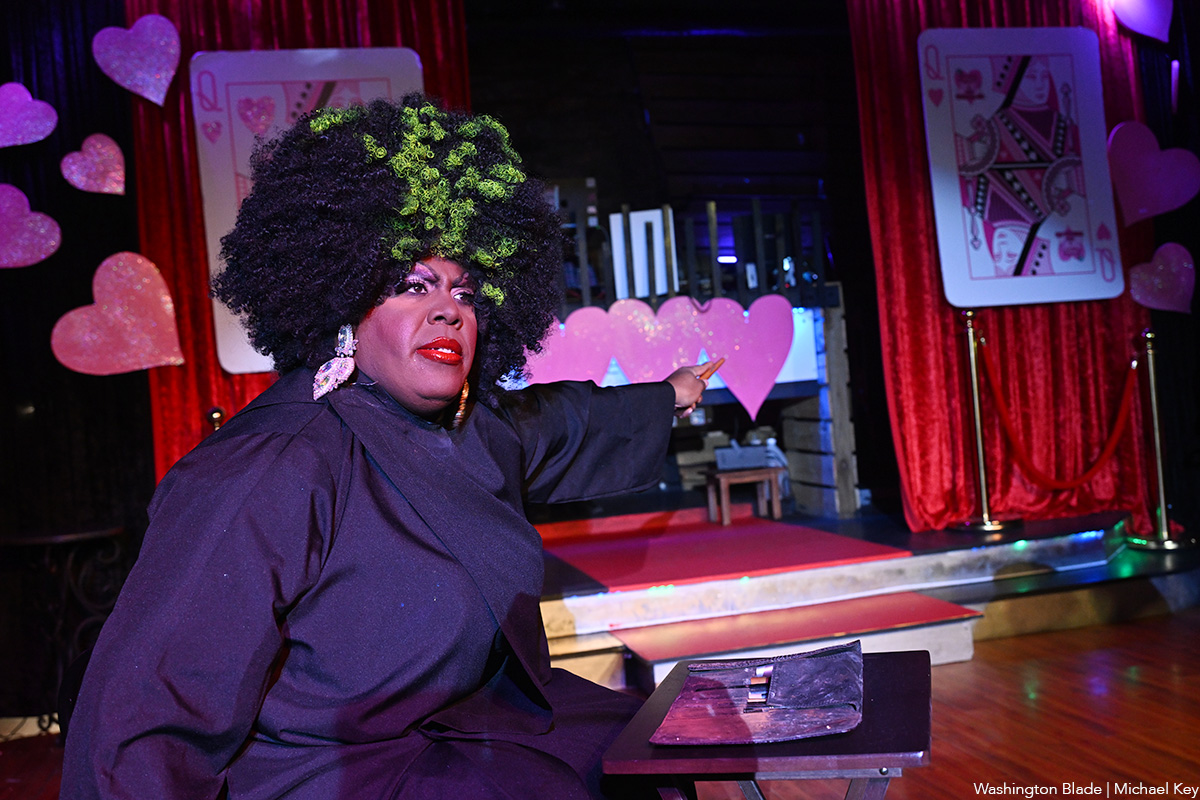
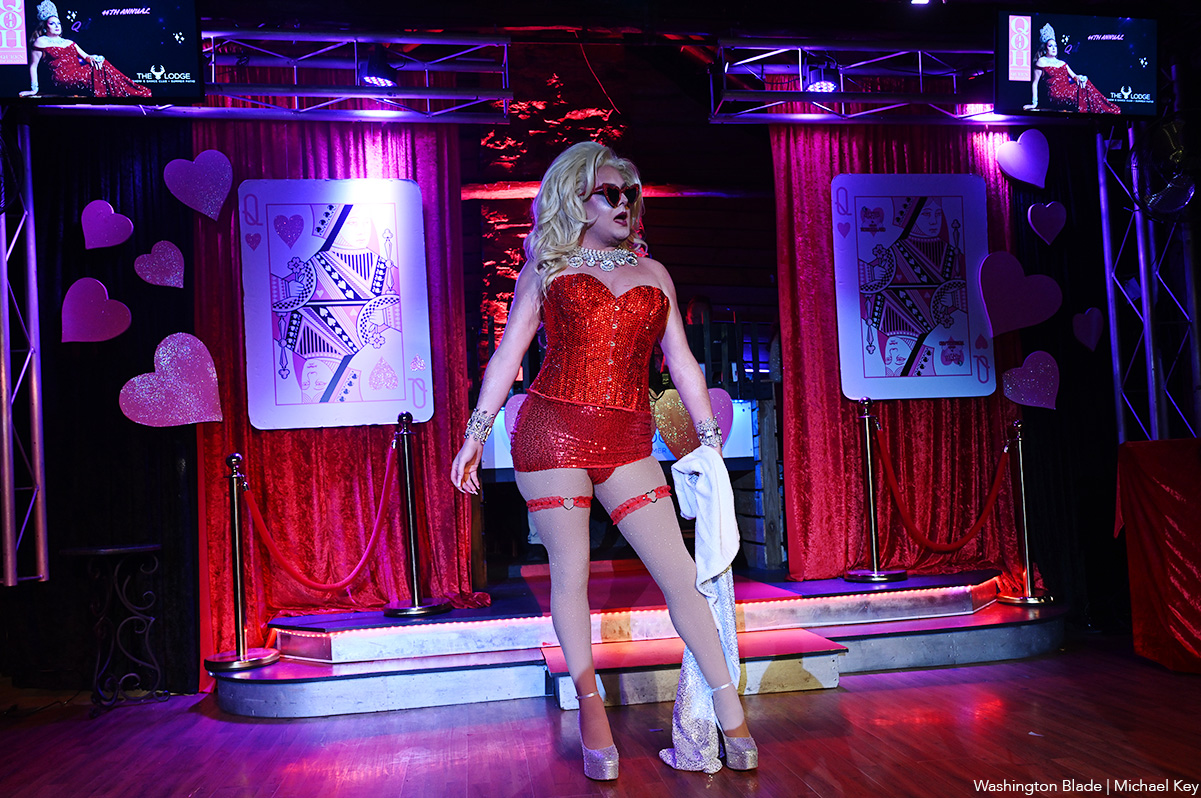
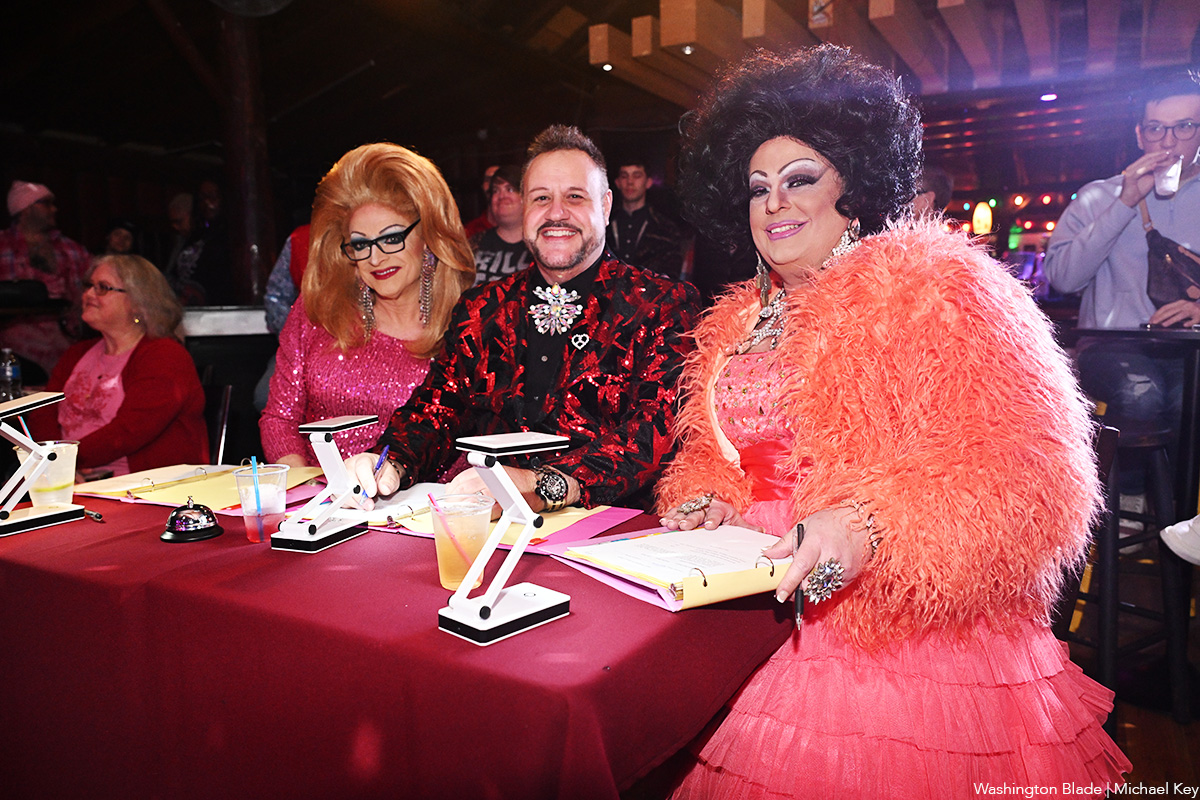
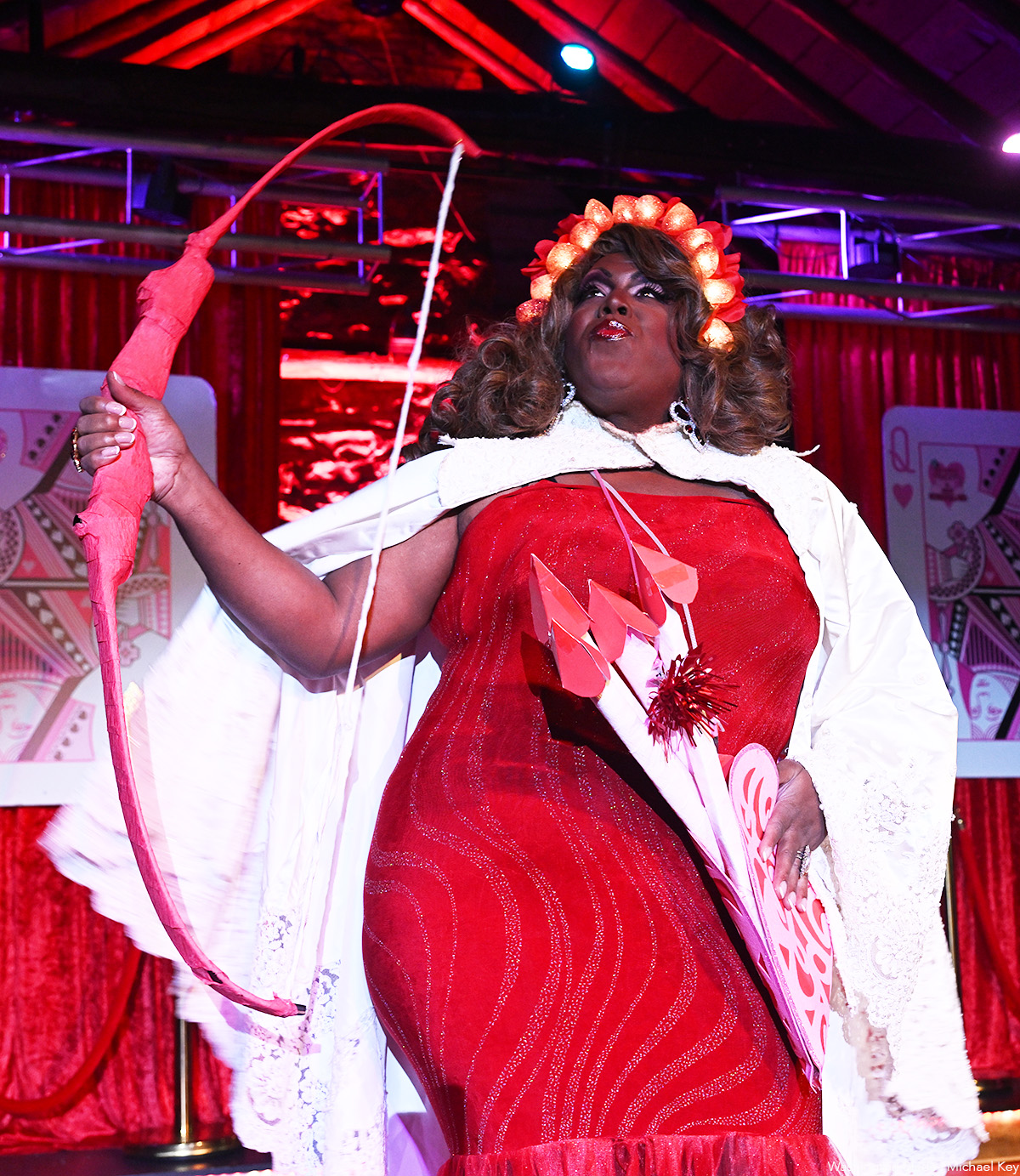
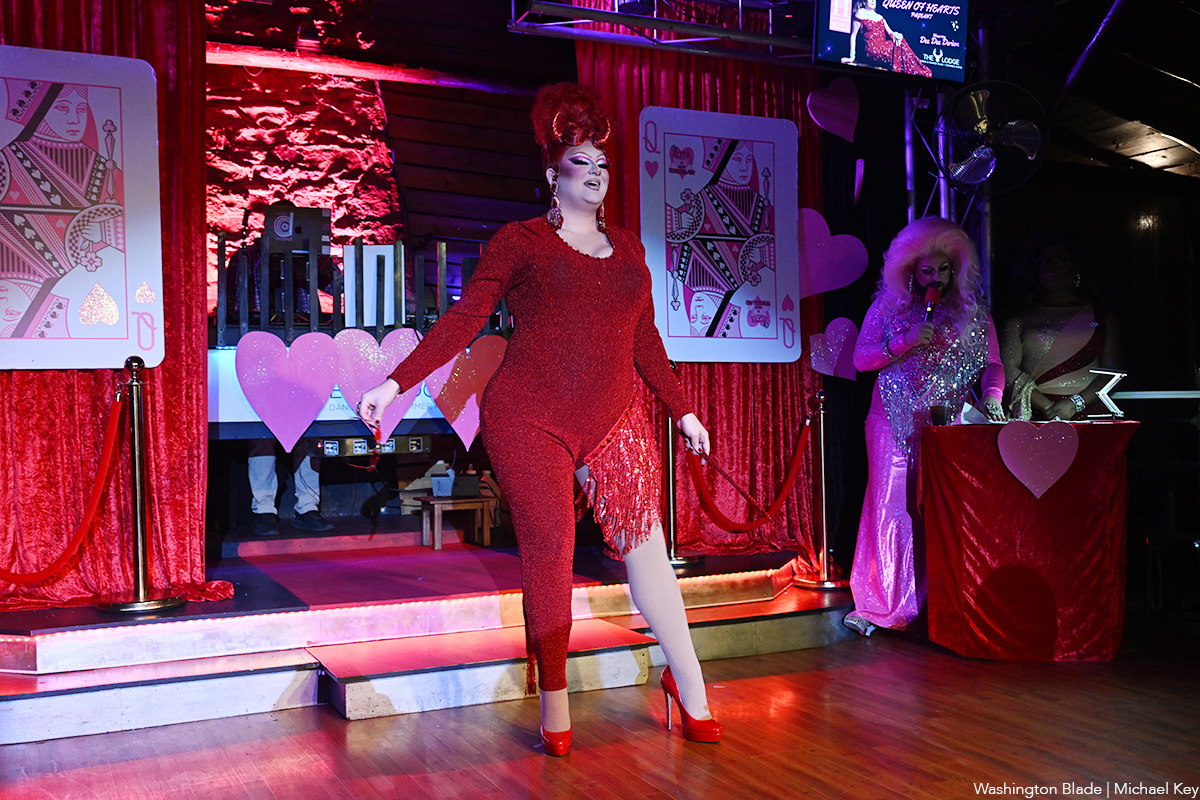
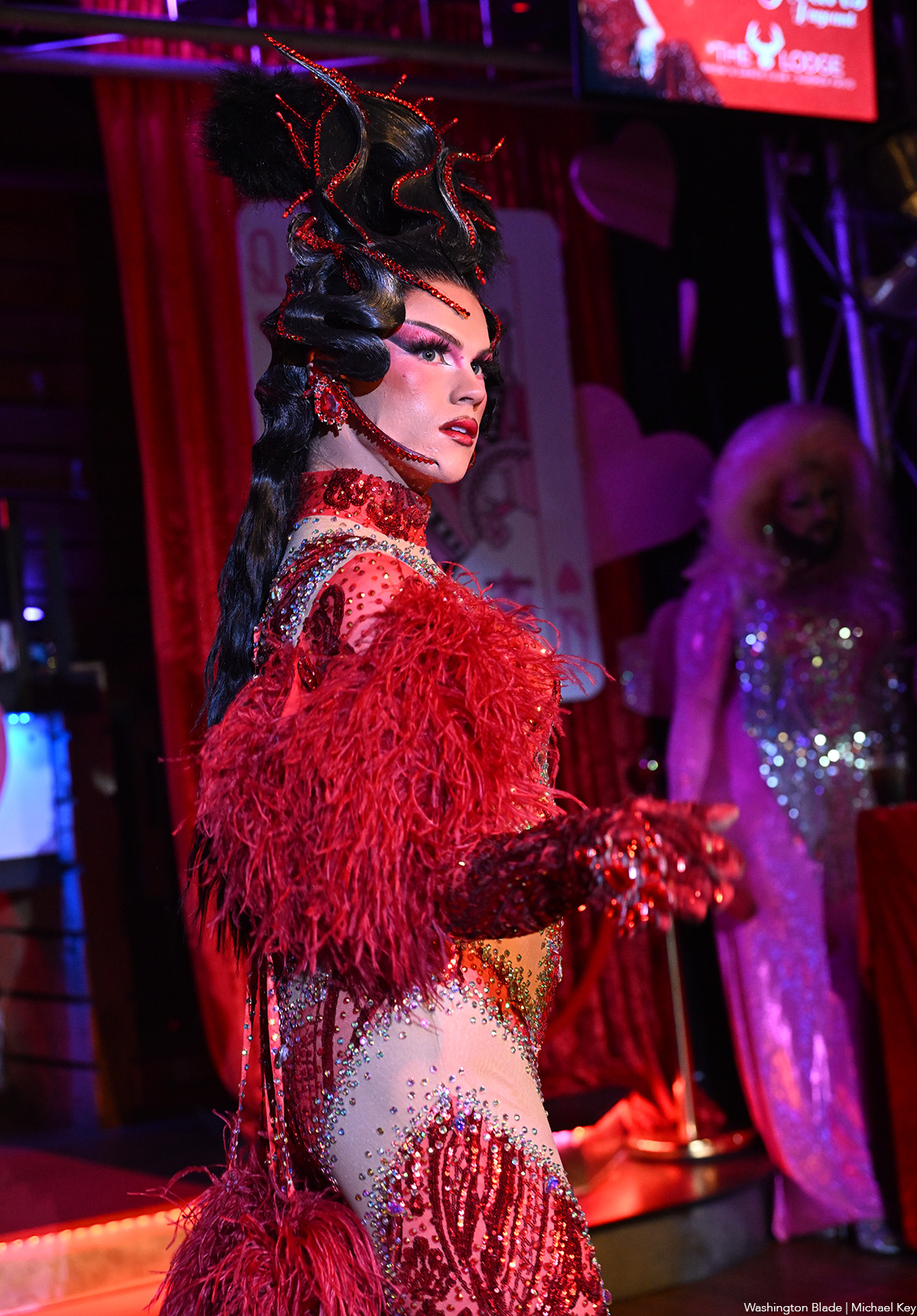
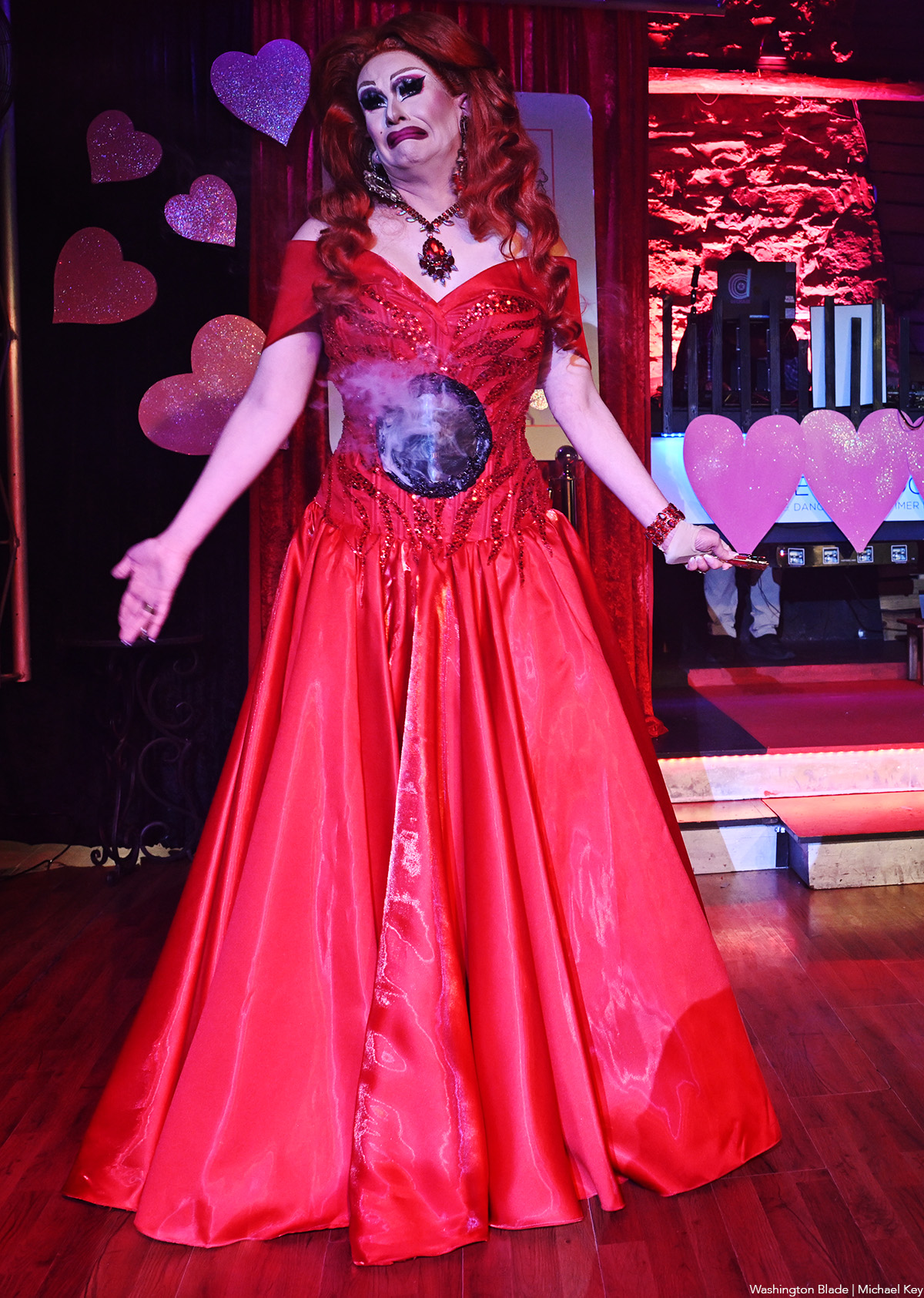
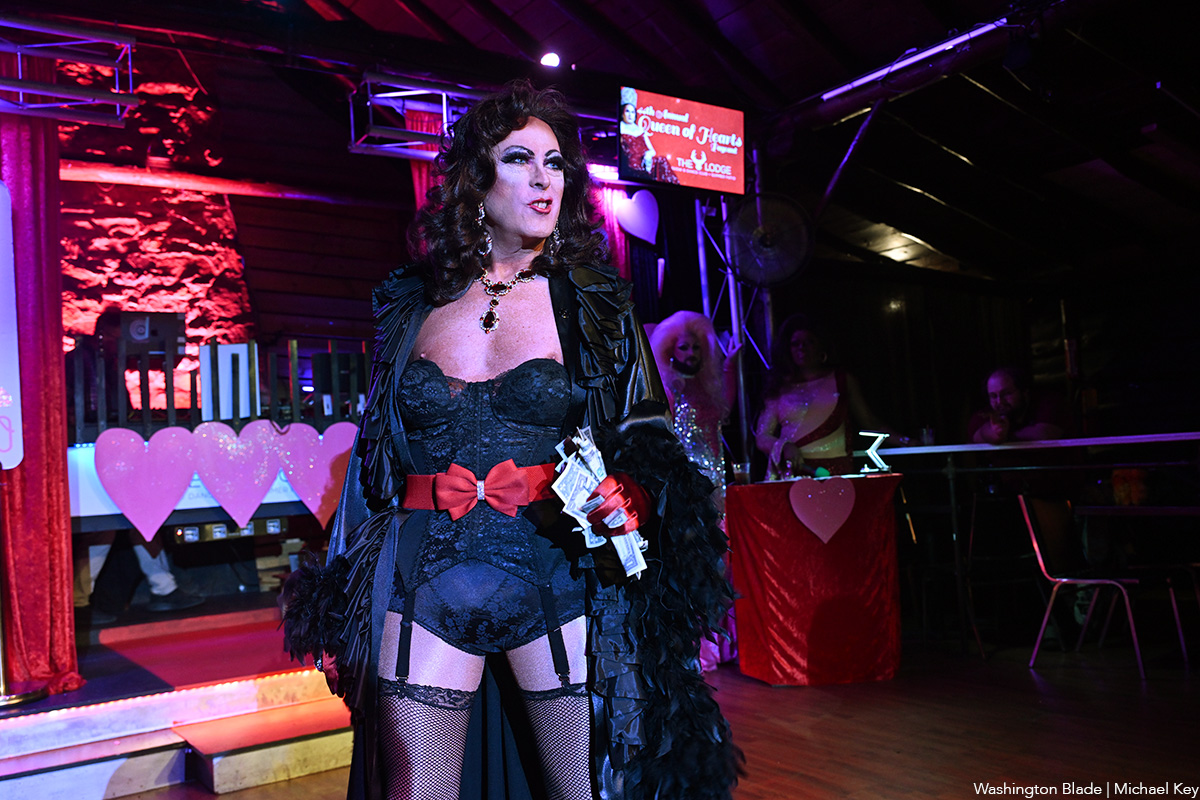
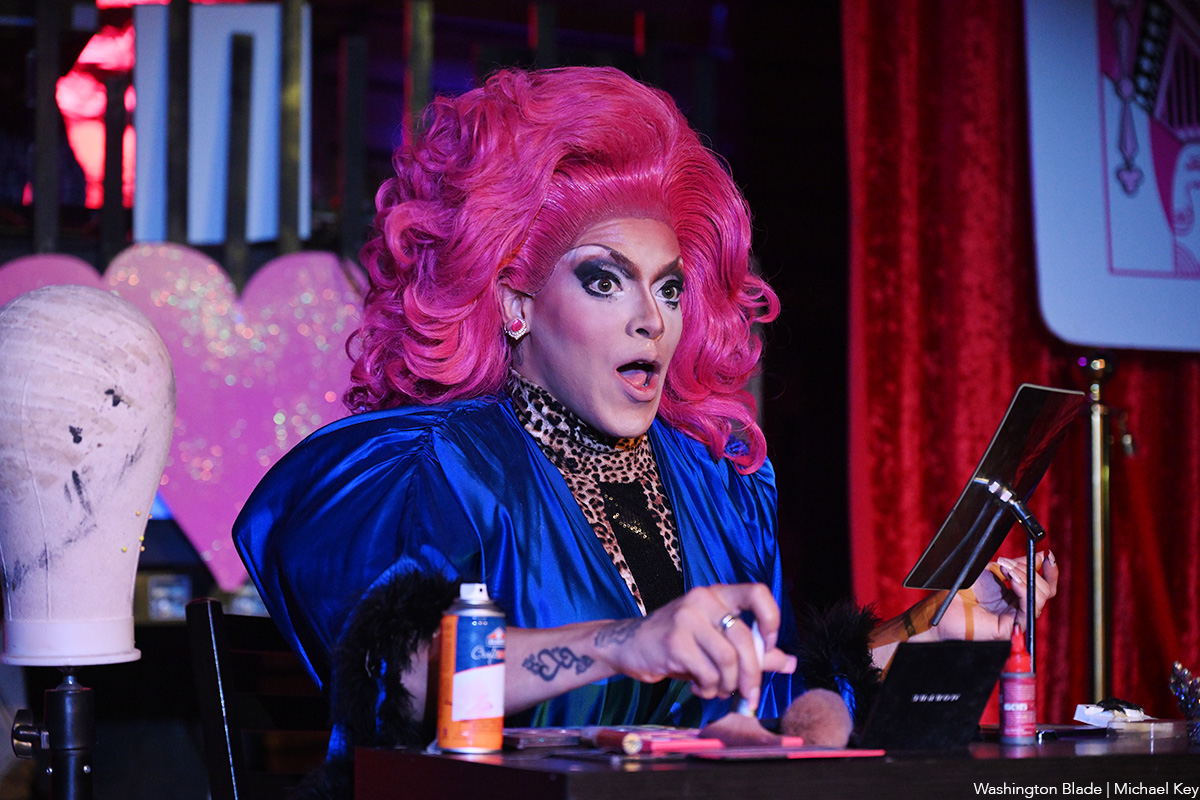
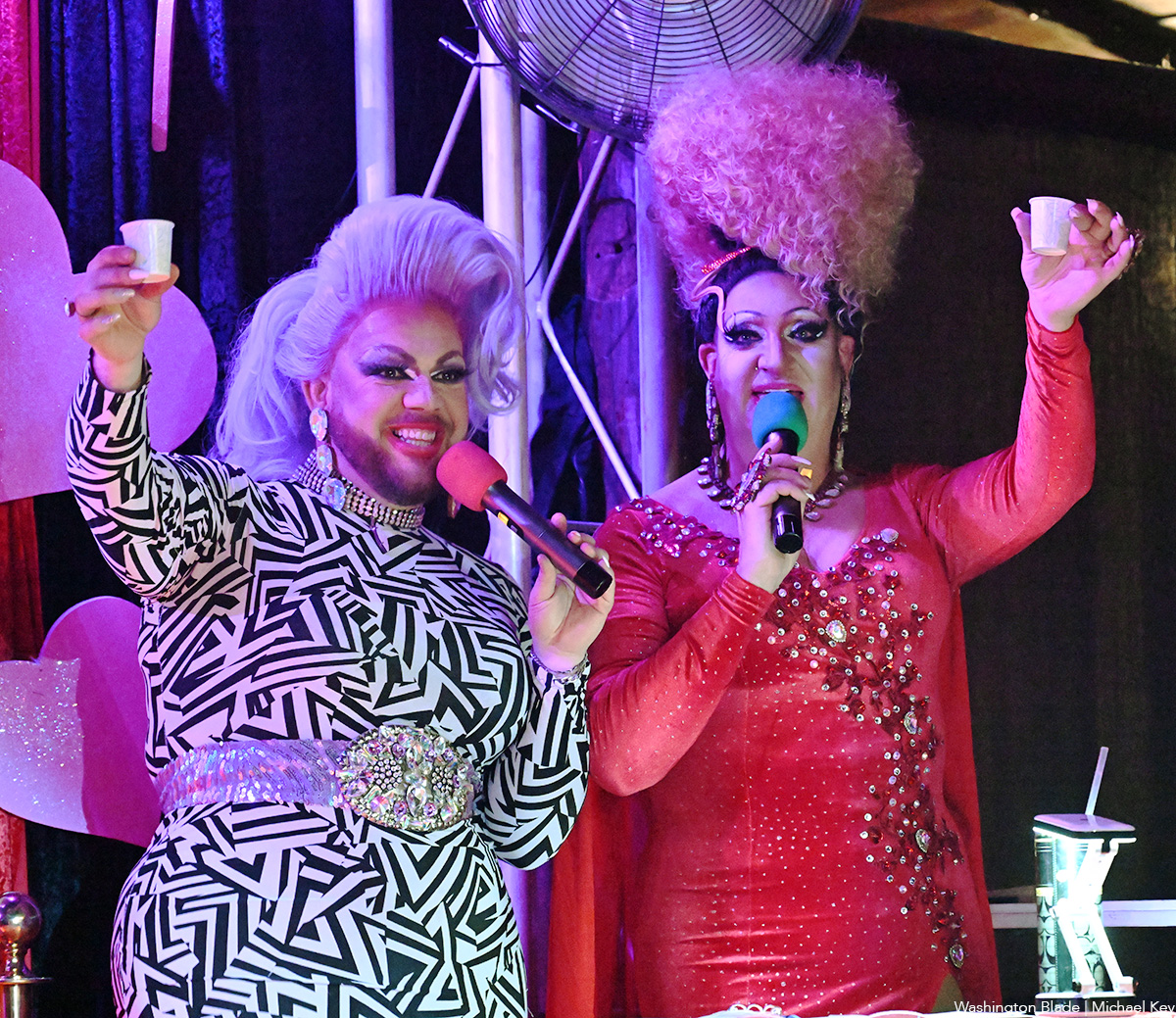
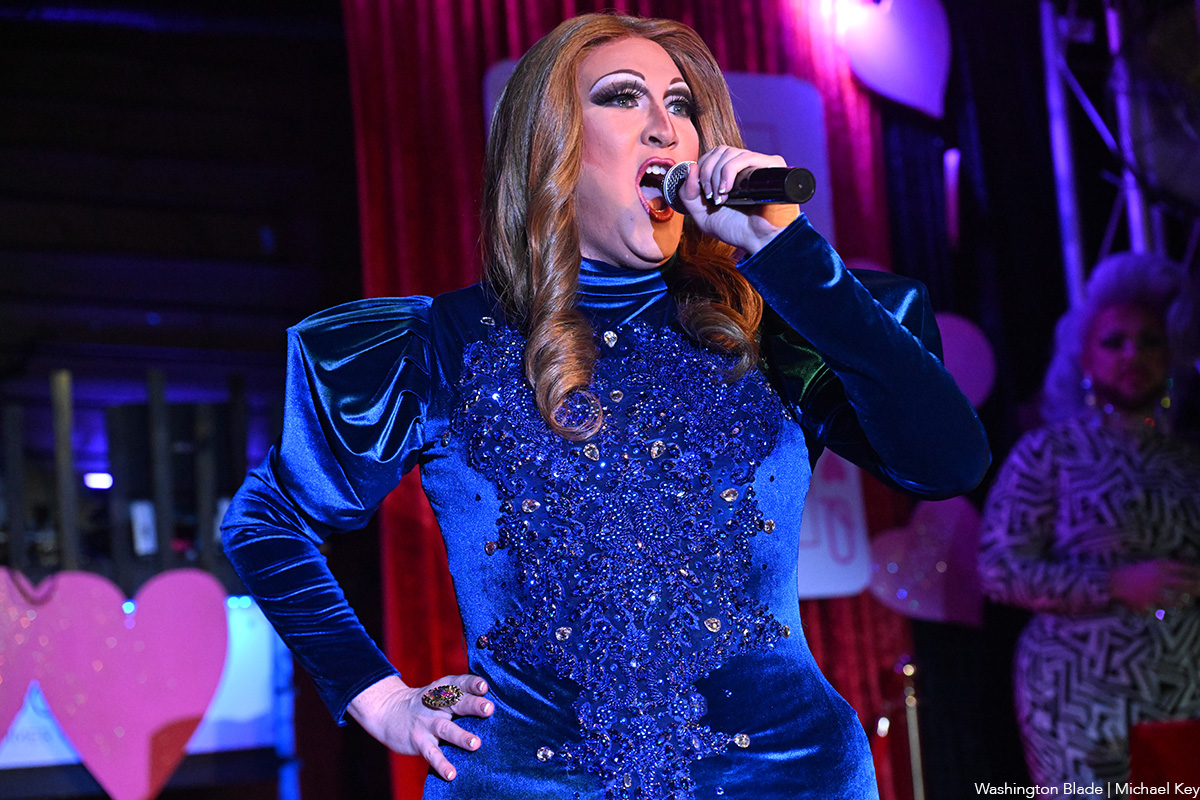
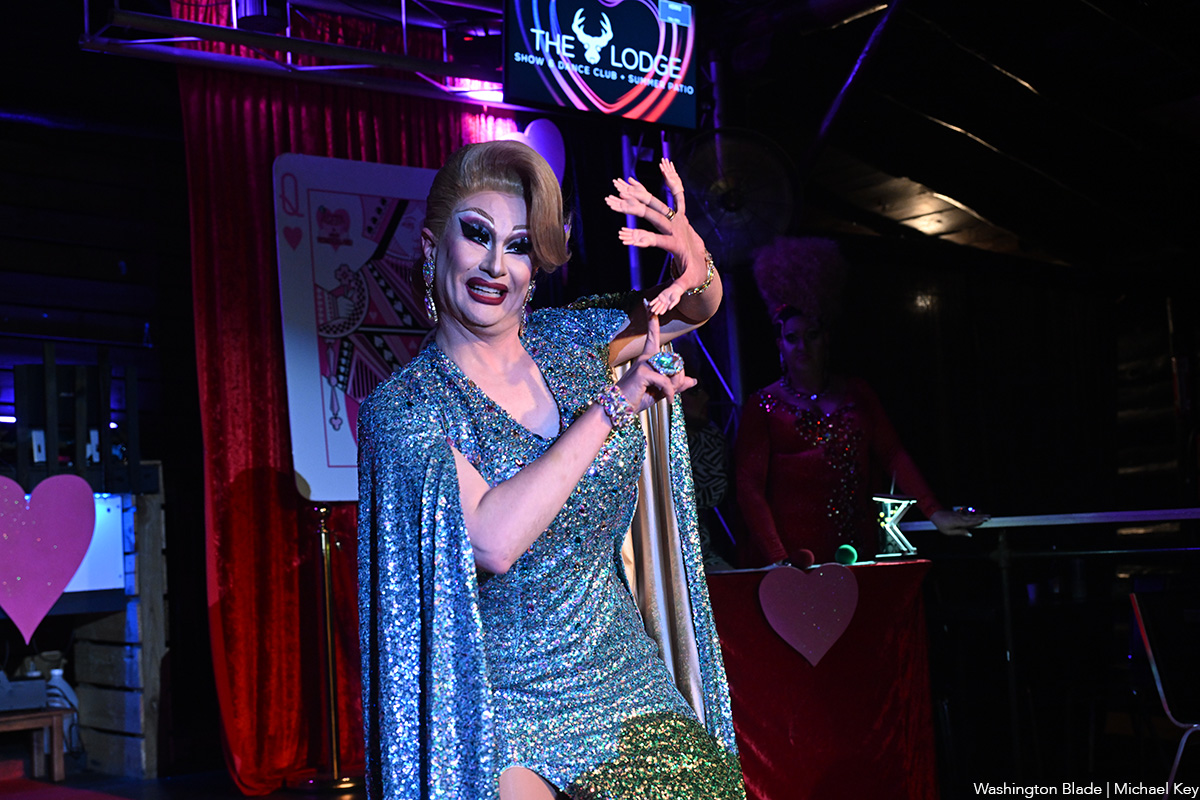
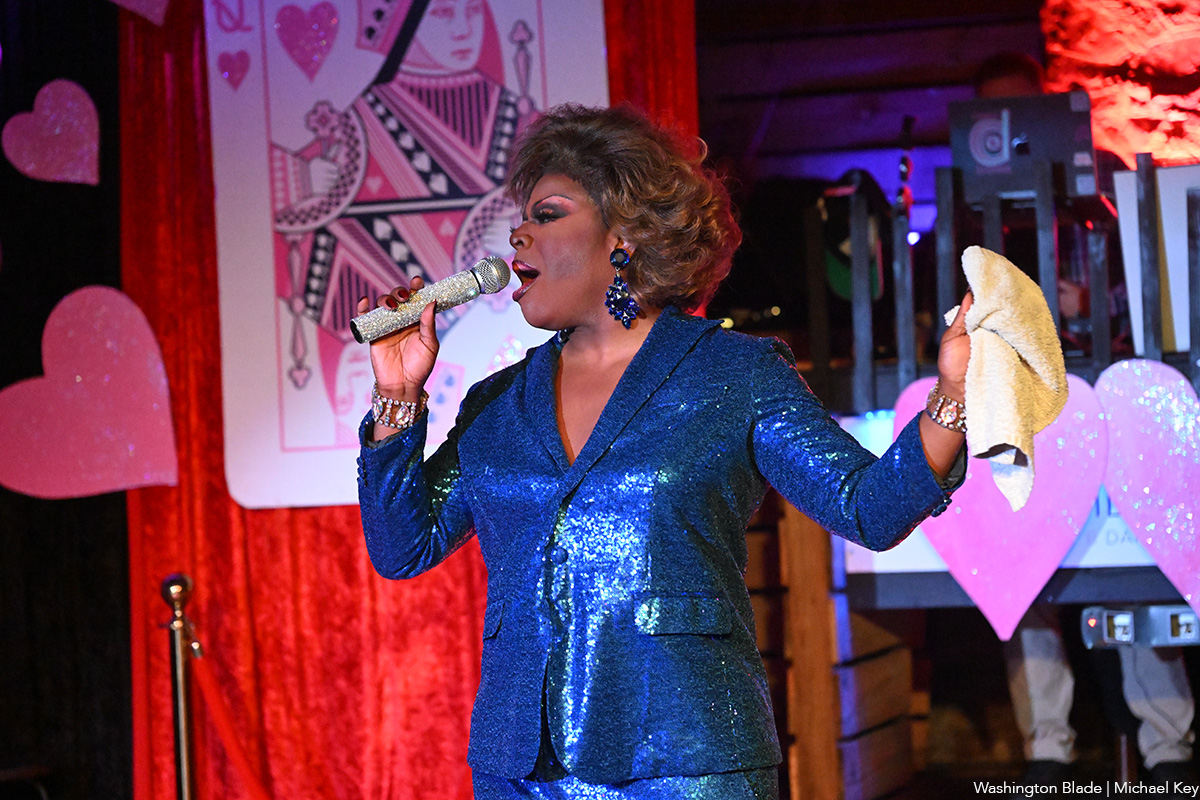
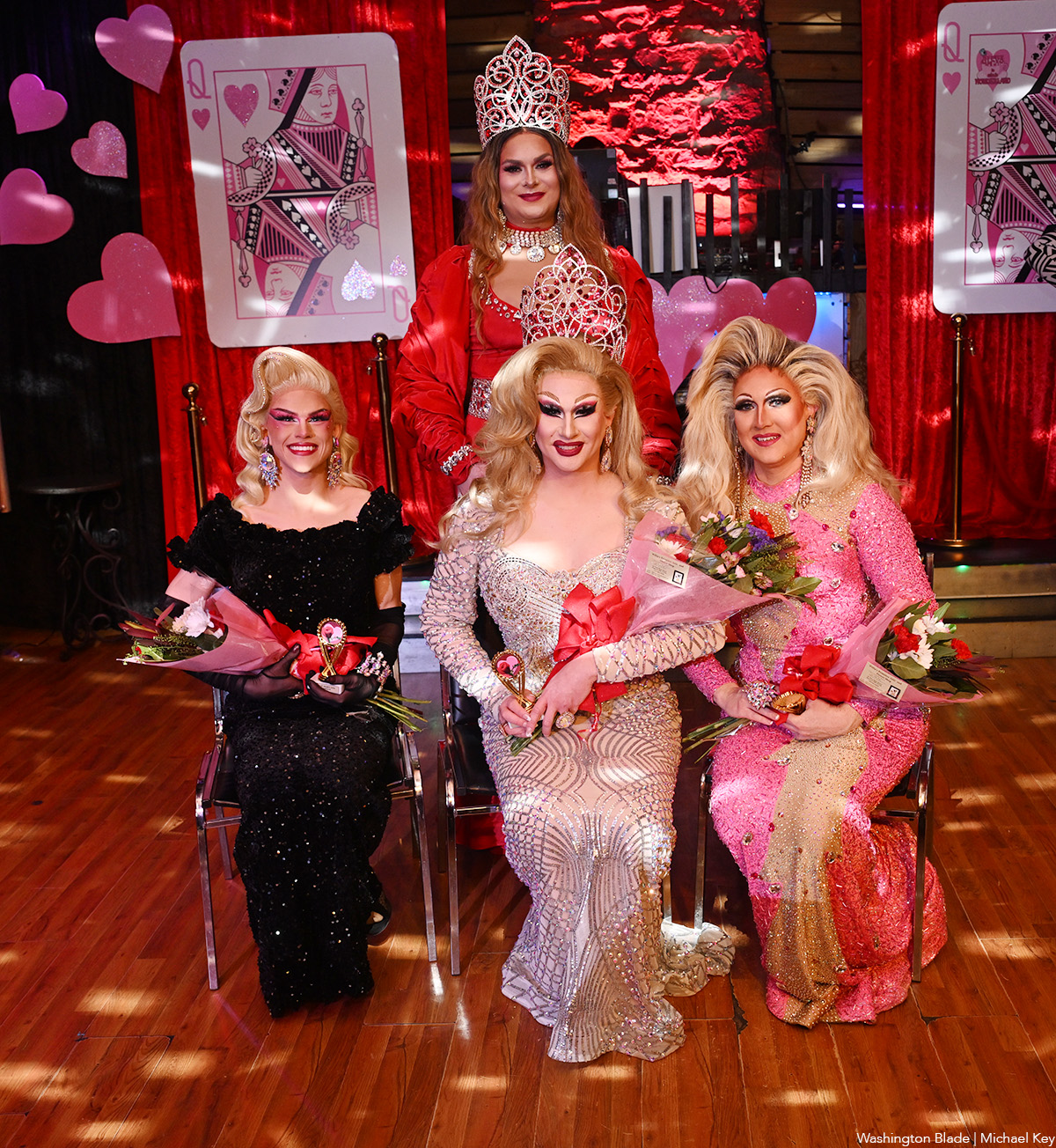
View on Threads
Books
New book profiles LGBTQ Ukrainians, documents war experiences
Tuesday marks four years since Russia attacked Ukraine

Journalist J. Lester Feder’s new book profiles LGBTQ Ukrainians and their experiences during Russia’s war against their country.
Feder for “The Queer Face of War: Portraits and Stories from Ukraine” interviewed and photographed LGBTQ Ukrainians in Kyiv, the country’s capital, and in other cities. They include Olena Hloba, the co-founder of Tergo, a support group for parents and friends of LGBTQ Ukrainians, who fled her home in the Kyiv suburb of Bucha shortly after Russia launched its war on Feb. 24, 2022.
Russian soldiers killed civilians as they withdrew from Bucha. Videos and photographs that emerged from the Kyiv suburb showed dead bodies with their hands tied behind their back and other signs of torture.

Olena Shevchenko, chair of Insight, a Ukrainian LGBTQ rights group, wrote the book’s forward.

The book also profiles Viktor Pylypenko, a gay man who the Ukrainian military assigned to the 72nd Mechanized Black Cossack Brigade after the war began. Feder writes Pylypenko’s unit “was deployed to some of the fiercest and most important battles of the war.”
“The brigade was pivotal to beating Russian forces back from Kyiv in their initial attempt to take the capital, helping them liberate territory near Kharkiv and defending the front lines in Donbas,” wrote Feder.
Pylypenko spent two years fighting “on Ukraine’s most dangerous battlefields, serving primarily as a medic.”
“At times he felt he was living in a horror movie, watching tank shells tear his fellow soldiers apart before his eyes,” wrote Feder. “He held many men as they took their final breaths. Of the roughly one hundred who entered the unit with him, only six remained when he was discharged in 2024. He didn’t leave by choice: he went home to take care of his father, who had suffered a stroke.”
Feder notes one of Pylypenko’s former commanders attacked him online when he came out. Pylypenko said another commander defended him.
Feder also profiled Diana and Oleksii Polukhin, two residents of Kherson, a port city in southern Ukraine that is near the mouth of the Dnieper River.
Ukrainian forces regained control of Kherson in November 2022, nine months after Russia occupied it.
Diana, a cigarette vender, and Polukhin told Feder that Russian forces demanded they disclose the names of other LGBTQ Ukrainians in Kherson. Russian forces also tortured Diana and Polukhin while in their custody.
Polukhim is the first LGBTQ victim of Russian persecution to report their case to Ukrainian prosecutors.

Feder, who is of Ukrainian descent, first visited Ukraine in 2013 when he wrote for BuzzFeed.
He was Outright International’s Senior Fellow for Emergency Research from 2021-2023. Feder last traveled to Ukraine in December 2024.
Feder spoke about his book at Politics and Prose at the Wharf in Southwest D.C. on Feb. 6. The Washington Blade spoke with Feder on Feb. 20.
Feder told the Blade he began to work on the book when he was at Outright International and working with humanitarian groups on how to better serve LGBTQ Ukrainians. Feder said military service requirements, a lack of access to hormone therapy and documents that accurately reflect a person’s gender identity and LGBTQ-friendly shelters are among the myriad challenges that LGBTQ Ukrainians have faced since the war began.
“All of these were components of a queer experience of war that was not well documented, and we had never seen in one place, especially with photos,” he told the Blade. “I felt really called to do that, not only because of what was happening in Ukraine, but also as a way to bring to the surface issues that we’d had seen in Iraq and Syria and Afghanistan.”

Feder also spoke with the Blade about the war’s geopolitical implications.
Russian President Vladimir Putin in 2013 signed a law that bans the “promotion of homosexuality” to minors.
The 2014 Winter Olympics took place in Sochi, a Russian resort city on the Black Sea. Russia annexed Crimea from Ukraine a few weeks after the games ended.
Russia’s anti-LGBTQ crackdown has continued over the last decade.
The Russian Supreme Court in 2023 ruled the “international LGBT movement” is an extremist organization and banned it. The Russian Justice Ministry last month designated ILGA World, a global LGBTQ and intersex rights group, as an “undesirable” organization.
Ukraine, meanwhile, has sought to align itself with Europe.
Ukrainian President Volodymyr Zelenskyy after a 2021 meeting with then-President Joe Biden at the White House said his country would continue to fight discrimination based on sexual orientation and gender identity. (Zelenskyy’s relationship with the U.S. has grown more tense since the Trump-Vance administration took office.) Zelenskyy in 2022 publicly backed civil partnerships for same-sex couples.
Then-Ukrainian Ambassador to the U.S. Oksana Markarova in 2023 applauded Kyiv Pride and other LGBTQ and intersex rights groups in her country when she spoke at a photo exhibit at Ukraine House in D.C. that highlighted LGBTQ and intersex soldiers. Then-Kyiv Pride Executive Director Lenny Emson, who Feder profiles in his book, was among those who attended the event.
“Thank you for everything you do in Kyiv, and thank you for everything that you do in order to fight the discrimination that still is somewhere in Ukraine,” said Markarova. “Not everything is perfect yet, but you know, I think we are moving in the right direction. And we together will not only fight the external enemy, but also will see equality.”
Feder in response to the Blade’s question about why he decided to write his book said he “didn’t feel” the “significance of Russia’s war against Ukraine” for LGBTQ people around the world “was fully understood.”
“This was an opportunity to tell that big story,” he said.
“The crackdown on LGBT rights inside Russia was essentially a laboratory for a strategy of attacking democratic values by attacking queer rights and it was one as Ukraine was getting closet to Europe back in 2013, 2014,” he added. “It was a strategy they were using as part of their foreign policy, and it was one they were using not only in Ukraine over the past decade, but around the world.”
Feder said Republicans are using “that same strategy to attack queer people, to attack democracy itself.”
“I felt like it was important that Americans understand that history,” he said.

More than a dozen LGBTQ athletes won medals at the Milan Cortina Winter Olympics that ended on Sunday.
Cayla Barnes, Hilary Knight, and Alex Carpenter are LGBTQ members of the U.S. women’s hockey team that won a gold medal after they defeated Canada in overtime. Knight the day before the Feb. 19 match proposed to her girlfriend, Brittany Bowe, an Olympic speed skater.
French ice dancer Guillaume Cizeron, who is gay, and his partner Laurence Fournier Beaudry won gold. American alpine skier Breezy Johnson, who is bisexual, won gold in the women’s downhill. Amber Glenn, who identifies as bisexual and pansexual, was part of the American figure skating team that won gold in the team event.
Swiss freestyle skier Mathilde Gremaud, who is in a relationship with Vali Höll, an Austrian mountain biker, won gold in women’s freeski slopestyle.
Bruce Mouat, who is the captain of the British curling team that won a silver medal, is gay. Six members of the Canadian women’s hockey team — Emily Clark, Erin Ambrose, Emerance Maschmeyer, Brianne Jenner, Laura Stacey, and Marie-Philip Poulin — that won silver are LGBTQ.
Swedish freestyle skier Sandra Naeslund, who is a lesbian, won a bronze medal in ski cross.
Belgian speed skater Tineke den Dulk, who is bisexual, was part of her country’s mixed 2000-meter relay that won bronze. Canadian ice dancer Paul Poirier, who is gay, and his partner, Piper Gilles, won bronze.
Laura Zimmermann, who is queer, is a member of the Swiss women’s hockey team that won bronze when they defeated Sweden.
Outsports.com notes all of the LGBTQ Olympians who competed at the games and who medaled.

